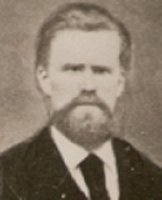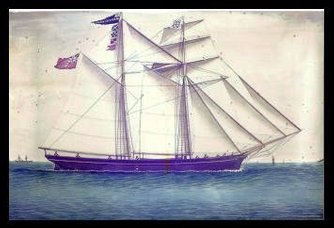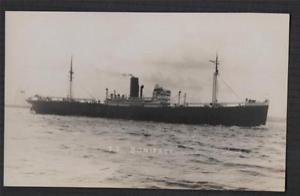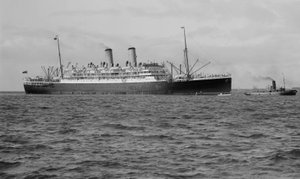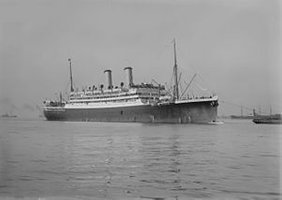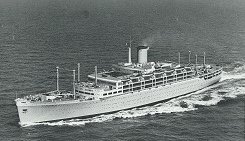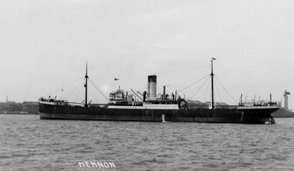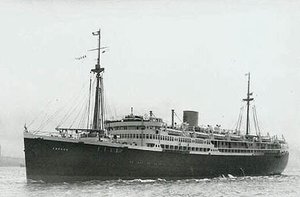ELVIN AND HOWARD WILLIAMS
The Williams brothers parents were descended from a large clan of Merionethshire seamen. The Williams antecedents go back to John and Margaret Williams, both born in 1750 at Pennal. Their son John was born in 1797 at Towyn and was listed as a river-boatman and ferryman who married Mary Lewis 1804-1876, of Pennal. John and Mary's son Master Mariner Richard Williams b.1842 had a distinguished maritime career as master of the schooners Jane Owens and Martha & Harriet. It was Richards son, another Richard Williams who went with his wife Mary, who came from Ffestiniog, to live in Borth around 1900, to take up a post as Chemist Assistant; a position he had previously held at Rhyddlan Flintshire. Elvin and his siblings were the grandchildren of Captain Richard Williams. The latter's brother Master Mariner Owen Williams 1838-1924, was a celebrated Aberdyfi identity with Borth connections. He captained the sailing ships Star, Catherine, Kate, Maglona and the Olive Branch, as well as being Trinity Pilot on the Dyfi. He saved many lives in the area and was the first Aberdyfi person to receive a Humane Society Medal for his courageous rescues. Owen married Elizabeth Davies 1837-1882, of Borth, the daughter of the master of the Sarah, David Davies b.1811, and Ann b.1814, born in Bow Street.
CAPTAIN RICHARD WILLIAMS MARTHA AND HARRIET
Elizabeth Davies' father Captain David Davies b.1811, was Aberdyfi historian D.W. Morgan's grandfather. Morgan was descended from seafarers on both sides of his family and claimed that Sion Dafydd, that is John David, were used as Christian names by the Williams family resulting from this Borth connection (Brief Glory, p.261). An example of this is Captain O. Williams' son John Davies Williams who began his seafaring career as a twelve year old ships boy on the Sarah Davies. He went on to serve on the Lady Alice, Ann Warren, Mervinia, Gifford, Bernard Hall and in 1906 he was on the schooner Pluvier whose master was his Borth relative Thomas Davies. He ended his career as a Trinity Pilot like his father. In August 1917 another of Owen's sons, using the same Christian names, David John Williams was torpedoed whilst serving as First Mate on the S.S. Boniface, he later went on to become a Captain.
S.S. BONIFACE
Captain Owen Williams married twice, firstly as already mentioned, Elizabeth Davies with whom he had 10 children, and then Jane Aspinall nee Roberts, a cousin of Elizabeth's, with whom he had 4 children. D.W. Morgan refers to Captain Williams' grandsons David and Llewelyn Hughes as having maritime careers. Elizabeth's brother was Master Mariner John Davies of Borth b.1836 who commanded the Miss Evans and the Sydney Jane. He went to live at Caernarvon and then Port Dinorwic, his wife Amelia's home town. Not long after his death tragedy struck when in 1907 his son William John Davies drowned whilst holidaying at Borth with his uncle, Captain Thomas Davies of Nathaniel House. William John was near the end of a months stay with his relatives when he, his cousin John James Davies and uncle Captain Thomas Davies went out in a small boat to pick up some fish from the Black Prince whose draught prevented it from moving in too close to shore, especially with the weather deteriorating. The boat reached the vessel and they got their fish but on the way back it capsized in the heavy surf. For a time all three clung onto the upturned boat, but William John, who had a bad hip and foot, slipped from the grasp of the other two and drowned. His poor mother was understandably distraught when the news reached Port Dinorwic.
In the gloomy ration-strangled post war decade the one highlight for the village children was the British Legion Christmas party held in the Public Hall. Jelly, blancmange and piles of sandwiches were helped down with cordial. The latter was bought to our tables in large jugs by Legion members, one of whom was Elvin who remained a stalwart of that fine organisation all his life.
I got to know him better when I was 15 and working at the local dairy. After delivering milk and eggs to the Welsh Kitchen Restaurant I would slip out to the chip making cottage at the back and join Elvin for a sly smoke. Here he demonstrated how a sack of potatoes were converted into chips. A few years later we would often have a drink together, but he never mentioned his war time experiences nor the fate of his brother. I remember him as a very kind considerate gentle person and the only time I saw him upset was at an outdoor function near the Lifeboat Station when local author Ted Richards got up to speak about the village mariners and their sacrifices. In true Welsh fashion Ted left not a dry eye in the audience including Elvin who had tears streaming down his face. What I did not know at the time was that he had lost his brother and many ship mates to the sea....and what a war can do to a small community.
Richard Elvin Williams was born in Borth in 1912 to Richard and Mary. Richard senior was the local chemist assistant who took the memorable photographs of Borth master mariners posed against the backdrop of Boston Stores, which was opposite the chemist shop. Their first born child Haydn, sadly died at the age of four. Elvin had three other brothers, Mervyn, Howard and Victor and a sister Eirlys. In those days being the only girl Eirlys naturally stayed at home with her parents while the boys were away in the forces. Elvin and Howard served in the Merchant Navy whilst Mervyn was a quartermaster in the R.A.F. and Victor a despatch rider in the Welsh Fusiliers.
ELVIN WILLIAMS WILLIAMS BOYS WITH HOWARD ON RIGHT
In 1926 Elvin ran away to sea at the age of fourteen managing to join a ship at Cardiff, unaware that it was only going to Liverpool. He was discovered and promptly sent home being told to join again when he reached 18 years of age. However when he reached sixteen a determined Elvin tried again and succeeded in getting a berth with the Orient Line as a Steward .
In June of 1940 Elvin was on the R.M.S Orford when she was bombed and set ablaze whilst assisting in the evacuation of British troops from the Marseille area. This vessel, which was the first to pass under the Sydney Harbour Bridge, became a total wreck and remained a hulk on the French shore until being scrapped after the war. Elvin sustained serious injuries from shrapnel to his head and broke his left shoulder, whereupon he was taken to Marseilles hospital to be patched up. Luckily the ships master Captain Savage went ashore and rounded up as many survivors as he could find and took Elvin and others back to the U.K. on a much smaller craft. Elvin got proper treatment back in Britain, including a small metal plate in his head. As a fit young man he was soon back at sea on the Otranto , the vessel listed on the certificate when he and his sweetheart Mavis got married in Malmesbury Wiltshire in January 1942.
R.M.S. ORFORD
The R.M.S. Otranto was built at Barrow-in-Furness in 1925 for the Orient Steam Navigation Co. as a passenger liner which also carried mail under contract between the Royal Mail and the Orient Line; hence R.M.S. donating her role as mail carrier. R.M.S. Otranto was named after the southern Italian town of the same name. There had been a previous Otranto built in 1909 as a passenger liner which became an armed merchant cruiser during W.W.1 and sank after a collision in 1918. The R.M.S. Otranto had an eventful career; in 1926 she was damaged after striking a rock at Cape Grosso, Greece, during a violent rainstorm. Two years later she collided with a Japanese steamer Kitano Maru and was badly damaged. In 1932 she took part in the rescue of the passengers and crew of the French liner Georges Philippar in the Gulf of Aden. Later in that same year she sank the barge Why Not in the Thames estuary. In 1939 the Admiralty requisitioned the Otranto, just as they had done with her predecessor in 1916, and converted her to a troop carrier. By 1942 she was further modified to carry landing craft and took part in the invasion of French North Africa. The following year she was involved with the landings at Sicily and Salerno. From thereon in until 1948 she resumed her role as a troop carrier. From 1948 to her eventual scrapping in 1957 she resumed life as a passenger liner carrying 1400 or so passengers on the London/Cape Town/ Australia route.
R.M.S. OTRANTO
Elvin's next ship was the Oronsay a 20,000 ton ocean liner which had Borth associations as one of its long time masters was the highly decorated Borth native Captain Roberts of Gordon Villa, 1900-1978. The Oronsay was requisitioned during World War 2 and converted into a troopship and had a remarkable service record prior to her sinking. This vessel had taken part in the Norwegian campaign with the evacuation of Narvik on the 7th June 1940. At the end of June she was evacuating British troops from France when she was bombed, destroying the bridge, killing crew members and injuring her master Captain Savage. Despite his wounds the captain guided her home using a pocket compass, sextant and a map. In August of that year she took 350 evacuated children from Britain to Nova Scotia. In October she was part of a convoy carrying troops to Egypt when she was attacked by aircraft 70 miles off the Irish coast. Luckily the bombs missed her but the blast disabled her engines. Thankfully it was very stormy and u-boat activity was limited, and after speedy repairs she made a safe passage back home. In the early part of 1942 the Oronsay was involved in the invasion of Madagascar then controlled by the Vichy French. Captain Roberts of Borth won a D.S.C. for his outstanding seamanship in that campaign and he is featured in another segment of this website.
M.V. ORONSAY
In October 1942 , after the Madagascar campaign, and a stop in Cape Town delivering Italian and German personel to P.O.W. camps in South Africa, she headed back to the U.K. with cargo, military personel and passengers. Elvin was on board when she was torpedoed by the Italian submarine Archimede and eventually sank. He ended up in a lifeboat with 25 others. Six crew members were lost in the engagement but 328 were rescued after 12 days adrift in various lifeboats by H.M.S. Brilliant . Unfortunately Elvin's lifeboat was picked up by the Vichy French vessel Dumont d'urville and all the crew were interned in Dakar under appalling conditions which almost ruined Elvin's health
After internment at Dakar and a recuperating period at a repatriation hospital in Liverpool Elvin thankfully regained his sight and recovered from the black water fever he had contracted in the internment camp. A very weak and thin man was eventually put on a train for the journey back to Borth. His wife and baby son Gareth whom Elvin had yet to meet, and sister Eirlys were waiting at the station. It took a while to recognise the gaunt, grey haired figure who got off the train. His recovery was slow and it took him a long time to speak about his experiences during the war. One amazing bit of information that his children learned was that this man, born and bought up almost on the beach at Borth, who became a sailor, could not swim. Elvin lived until the age of 67 and had 4 children and 7 grandchildren.
Captain Owen Williams' great great granddaughter Valerie, married Howard Bromley. She went to live in Borth where Howard ran restaurants with his father Terry. Terry Bromley was an officer in the Royal Navy during the Second World War, to date however we have very little information about his career. Another case of war experiences never discussed. I did not realise that Terry had been in the navy until he came down to the beach one day and stated that with over a decades experience at sea Glas Y Dorlan, a dory Alun Evans and I owned, was one of the most suitable boats for Borth's storm beach conditions that he had seen. One of the restaurants the Bromley's ran was the Welsh Kitchen and there Valerie met Elvin. They soon realised that they were related.
Elvin's brother Howard Lloyd Williams was a quartermaster in the Merchant Navy. He was torpedoed twice, the second time fatally. In March 1941 he was on the M.V. Memnon which was owned by Alfred Holt &Co, Liverpool. This 7,500 ton vessel was carrying 8,000 tons of general cargo, 2,700 tons of wheat and 3,000 tons of zinc concentrate. Her voyage out from the U.K. to Port Pirie Australia was uneventful but her return via Freetown was something else. Three days after leaving South Africa, whilst heading for home she was torpedoed by U.boat 106, captained by Jurgen Oesten, 220 miles west of French West Africa.
M.V. MEMNON
Of the 70 crew 65 managed to survive the sinking, including Howard. He kept a diary of his lifeboat journey in which he makes some pithy comments, and the master John Parry-Williams does not get a favourable mention.
LOG OF THE SINKING OF THE M.V. MEMNON AND OUR “BOAT TRIP".
MARCH 11TH 1941: Was turned in reading when the ship was hit by a torpedo. Jumped out and managed to grab my life-jacket and make for my boat, no.6. Lost my life jacket when water poured out of hatch and a board hit me in the stomach. Luckily I saw the lifeline in the water which was waist high and pulled myself along to the well-deck ladder. Time 2:15p.m. Reached boat deck and assisted bosun and others to cut lashing adrift on boat. Climbed in to clear away and ship plug. Remainder of our crew climbed in with the Chinese having to be pulled over the gunwale. Boat refused to lower until the bosun luckily thought of hand gear which saved the situation as no. 3 boat was in the same predicament and had to be left as no-one thought of using the hand gear. Third mate lowered the boat but was unable to board and had to climb into no.4 boat. As soon as we were in the sea we were swept aft over no.5 hatch where we hung on for a while balanced on a derrick until the ships stern went under and we were carried across to no.6 hatch. There the port bow got stove in against the corner of the poop. All the while men and one boy in the boat did all they could to prevent further damage being done. Turning gear was useless in the swirl of water and boat began taking in water. A sudden surge of water up from the hatch pushed us clear and we got turning gear going. I then steered for the Chinese pantry-man who was clinging on to an upturned sandbox, we got him aboard o.k. I then went over to a raft with some men on it. They were the two gunners and a.b's Evans and Garrett who had no time to get to their boats but had launched a raft off the poop. With them was a half dead Chinaman who they had dragged from the water and we got them all aboard safely. We were now floating on our air tanks. No.4 boat was in difficulties in the same spot over the stern of the ship and only got clear when she sank. As soon as the stern went under the submarine surfaced and their crew came on deck. The commander spoke in perfect English to no.4 boats crew and pointed them to two Chinese struggling in the water who had jumped overboard in fright. We noticed a crest like a seahorse on the conning tower, but there was no indication of nationality and I think it was a craft of about 400 tons. Shortly afterwards she submerged just after the Memnon took her last plunge and we were left on our own. Weather not too bad but big swell running. Had to abandon our damaged boat and joined the second mates boat as did no.4 boats crew making up a compliment of 48. the mate then salvaged stores and water out of motor boat which had floated clear; and also out of two lifeboats which we had abandoned. Captain's boat lay off the whole time and did not attempt to salvage stores for themselves. The captain decided to hang about close to the spot as a Spanish ship some 200 miles away had answered our s.o.s. The first night was horrible nearly everyone was sick presumably with the smell of cordite and fuel oil plus the unusual movement of the boat. Wet miserable and very cold as very few of us had any clothing except what we were wearing at the time. We shared our blankets to the ones with the least clothing. Cadet Stone had saved a suitcase containing clothing that he gave out. I received a jersey which was a God send. Everybody it turned out had been very cool, the two wireless operators were last to leave the ship and had to swim for their boat.
WEDNESDAY 12TH: Still drifting to sea anchor, no sign of any craft. Started the rations issued at 8a.m and 5.30p.m. A.M. One biscuit and half a dipper of water P.M. One biscuit condensed milk and half a dipper of water. Everybody quite cheerful. Herd the senior electrician suffering from shock. Nights are the worst. Rearranged crews. Three of ours went to the old man's boat. He would not take any more although it was a 50 person boat. The old man showed up very bad through it all. Ben Evans, Bill Bateman, Bob Jones and the third mate transferred.
THURSDAY 13TH: Hoisted sail started watches on turning gear. One hour in four. Wind N.E. Course S.E.
FRIDAY 14th: Still jogging along. Everybody cold and wet. Shipping quite a lot of spray and had miserable night.
SATURDAY 15th: Still wet and cold. Have rigged cover over boat on weather side but spray still comes in. Making about 1 ½ knots. Old man decided to go on ahead his boat much lighter and faster than ours. Making for African coast near Dakar. Ultimate aim if possible is Bathurst.
SUNDAY 16th: Can it get warm, still everyone cheerful. Herd the only one not back to normal now. Seems to have lost hope and the will to pull through.
MONDAY 17th: Water ration doubled, half a dipper at noon and another at midnight. Sang a few songs in honour of St Patrick’s. Everyone cheerful. Chinese only ones not pulling their weight, but they’re on top line for rations and have to be watched each time.
TUESDAY 18th: Weather remains unchanged with heavy sea running. Keeping up to northward as much as possible. Can manage him at night. Afraid of making too much leeway. Still shipping water. Flying fish came aboard and Bill Pilcher and I ate raw very nice but made us thirsty.
WEDNESDAY 19th: Everyone very cheerful as we expect to sight land any day now. Keeping a good lookout. Extra bully beef for tea. Sing song after covering up for night. Not shipping much spray after nailing down cover.
THURSDAY 20th: Change in colour of water noticeable. Took a sounding and got about 20 fathoms. Bill sighted land at 10.25 a.m. and got his 2 extra dippers of water. Mr Herd was very bad, got worse, we did all we could for him but he died just after we sighted land. We buried him at sea at 12.30. Mr Hill second mate read a short service out of the only bible saved by Lightwood the engineer.
FRIDAY 21st: Sighted 3 fishing canoes and made contact. They were natives of Mauritania (Senegal). We questioned them and they told us the port of St Louis was not far away. We persuaded one of them to come aboard and pilot us in. everyone excited and extra rations all round. We could not make St Louis as the swell on the bar would have smashed our boat and crew. Decided to carry on to Dakar.
SATURDAY 22nd: Taylor second steward and bosun feeling ill and looking it too. Stood off Dakar for the night. Mate wanted to carry on to Bathurst but having 2 sick men aboard we persuaded him to put in to Dakar and chance being interned.
SUNDAY 23rd: On our way in to Dakar when French ship Kailisse coming out stopped and signalled us alongside. They took the steward and bosun aboard and gave us enough stores and water to carry on to Bathurst. The crew and passengers were most kind to us and couldn't give us enough, even sent down packets of cigarettes and a huge bottle of wine. We thanked them and gave three hearty cheers then hoisted sail for Bathurst.
MONDAY 24th: Kept too far to seaward overnight then ran too far south and east. Some doubt as to our position. Mate not sure and second mate no idea. Eventually after spending an almost disastrous time stuck on a reef and pulling like fury until the tide turned then we headed to the north west. We had to relieve every half hour on the turning gear and left the Chinese off as they did not seem to realise our danger or attempt to pull harder. Jack had nasty stomach trouble and we had our minds bent on getting in before dark. We arrived at the mouth of the Gambia River at about 4p.m. and a launch came out and took us in tow about half a mile or so from Bathurst. We scoffed the last of our bully beef and condensed milk as we came alongside the jetty at 6 p.m.
The governor of Gambia Sir Thomas Southern and Lady Southern were down to greet us with a number of other British residents. We were taken in two lots to our quarters. Our legs were very weak through lack of blood circulation. Twelve of us were put up at the hospital vand given a delicious bowl of soup and then coffee. After a lovely hot bath we were all tucked in and it felt grand to stretch out.
The next day (Tuesday) a crowd of ladies descended on us with piles of clothing of all descriptions and we were all rigged out. So by the mercy of God our fifteen days in the boat came to a happy end.
Arthur Clements my room mate for the past three years, and a fine shipmate, was trapped along with three Chinese in the quarters aft when the stern went under. The door closed just behind me and he was unable to get out.
REMARKS:The Sinking
1. The fo’c’sle, very dangerous having only one exit. The other four men could have saved themselves had there been an escape exit on to the poop.
2. There was not a minute to spare as the ship sank in 12 minutes. The after end went under in less than 4 minutes.
3. The boats were lashed with fore and aft lashings which were of wire with the eye over the hooks in the boat. These were in the boat and fouled the turning gear. Ship lashings in the boat would be far better as they would remain on the ship leaving the boat clear on trailing ropes. Also the rings on the blocks were a danger in no.4 boat as they re-hooked twice of their own accord. Also aft painter fouled screws and was quite unnecessary.
After a brief spell at home Howard joined the 11,330 ton British motor passenger ship Abosso. She was owned by Elder Dempster Lines of Liverpool. Eerily on the 29th October 1942 they were on the same route, Cape Town to Liverpool, carrying a cargo of 3,000 tons of wool and bags of mail when the ship was torpedoed 700 miles north west of the Azores. The attack was by u.boat 575 commanded by Gunther Heydemann. The loss of life was heavy. The master Reginald William Tate, 150 crew members including Howard Williams, 18 gunners and 193 passengers were lost. Only 12 crew members, 2 gunners and 17 passengers were picked up by H.M.S. Bideford commanded by W.J Moore R.N.R which was escorting a nearby convoy at the time and landed the survivors at Londonderry. Listed as passengers were 34 Dutch submarine crew members who were on their way from South Africa to England to contribute to the war effort. Their commander, who was one of the fatalities, H.C.J. Coumou, had protested early in the voyage about the speed of the Abosso being only 14.5 knots and that the ship would be unescorted. U.boat 974 was handed over to the Norwegian Navy in 1944 to be destroyed. Twenty days earlier, unbeknownst to him, his brother Elvin was torpedoed on the Oronsay in the same waters and survived to spend the rest of the war interned as a prisoner of war of the Vichy French in Dakar West Africa. The war was a tragic time for Elvin as upon returning home suffering the effects of his incarceration he found that he had lost his brother and both his parents . The one comforting consolation at the time was returning to his wife Mavis and their young son Gareth.
M.V. ABOSSO
Valerie and Howard Bromley, who moved to Australia and successfully ran businesses there, have provided much of the family history, and in an act of incredible generosity presented me with two beautiful ships paintings of the schooner Nerissa and the steamer Commodore to care for prior to them being donated to the National Library of Wales. I thank Peter Williams, nephew of Elvin and Howard, for the information and a copy of Howard's lifeboat log and Phil Williams. I also thank Elvin's daughters Sandra and Lynette and her husband Ken Howells for photographs and further information.
